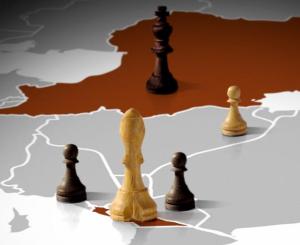By Peter Crail
TIME Magazine has recently highlighted an analysis entitled "Invading Iran: Lessons from Iraq" by Air Force Lieutenant Colonel Leif Eckholm, who works in the Strategic Plans and Policy Directorate for the chairman of the Joint Chiefs of Staff (the analysis was published by Stanford's Hoover Institution, where Eckholm served as a defense fellow).
As the title suggests, the analysis examines many of the challenges in securing a post-invasion Iraq, and how they would be similar, different, or magnified in the context of Iran.
One of the key takeaways, however, is a brief cost/benefit assessment of the decision to attack Iran and a recognition that the only sure-fire way that military force could stop Iran's nuclear program is through an Iraq-style invasion and occupation:
"Should tensions over nuclear ambitions rise to the point of military intervention, an air campaign seems a more likely course of action. Military airstrikes provide a stand-off capability that could severely hamper or delay Iran's march towards weapon production without bearing the cost of occupation and reconstruction, but not without a price of its own. Targeting the key nuclear infrastructure sites like the Bushehr Research Reactor, the Arak Heavy-Water Reactor/Plutonium Separation Facility, the Natanz Uranium Enrichment Plant, and the Esfahan Nuclear Technology Center would certainly be a major setback to Iran's nuclear ambitions, but the regime has devoted considerable effort to hide, diversify, and protect its nuclear assets, and the regime's determination to acquire nuclear weapons actually may well increase after such a strike. Furthermore, the regime would remain in place and likely benefit from a nationalistic reaction that would strengthen domestic political support. Proponents of a more comprehensive military intervention will argue that a full-scale invasion is the only means by which to crush the regime and its military apparatus, guarantee total elimination of the Iranian nuclear enterprise, and create a window for democratic change. But the price of invasion would be astronomical, and the nationalistic reaction would be fierce; thus, the projected cost in life and treasure must be weighed against the envisioned, yet unpredictable, advantages of a new regime in Tehran."
This assessment echoes the acknowledgement by former Joint Chiefs Vice Chairman General James Cartwright during an April 2010 Senate hearing that the only way military action would end Iran's nuclear program would be through invasion and occupation. Cartwright went on to say during the hearing that, while the United States military could carry out such an operation, "there would be consequences to our readiness and the challenges that we already face in this nation economically to pay for war."
It is important to note that an air campaign against select nuclear facilities wouldn't be a walk in the park either, as former DIA analyst and Washington Institute Defense Fellow Jeffrey White said during an ACA event in June:
"I think there are a lot of issues – important issues – related to an "attack," in quotes, on Iran and so it would be very complicated, problematic in some ways. I think the desired levels of destruction could be achieved, especially by us. But it would not be an easy operation and it is, I think, in my mind kind of in a last resort category."
Discussing Israel's own military option, Former Mossad Chief Meir Dagan was even more straightforward, saying it was "the stupidest thing I have ever heard."
Lt. Col. Eckholm's analysis provides an important contribution to answering questions that were not adequately addressed prior to the Iraq invasion, including what are the likely consequences and is it worth it? Military leaders naturally need to prepare for the possibility that they would be asked to undertake such operations. At the same time, those who are or aspire to be in a position to order those operations need to be aware of the extent of the military and economic commitments they, and ultimately the American people, would be making.
So when members of Congress say we should consider military force, or presidential candidates talk about a "military solution" to Iran's nuclear weapons ambitions, it is important to ask just what kind of military action they propose, and whether they have also addressed the types of consequences that military leaders and defense analysts describe.

